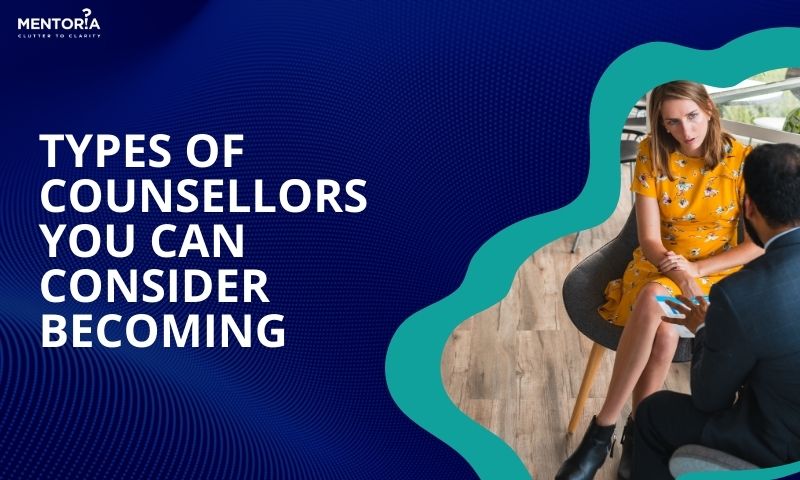Types of Counsellors You Can Consider Becoming

Are you looking for an enriching career where you can help improve other people’s lives?
If you’re a good listener, affectionate, incredibly determined and not scared of taking on a challenge, then a career in counselling could be ideal for you!
Counsellors work all across India and play a critical part in society. Despite the fact that each position has a different set of criteria, they all aim to assist people in resolving their problems in a highly confidential setting. It could entail helping people with addiction, family, or mental health issues. It may occur in various settings, including offices, hospitals, schools, and rehabilitation facilities. This blog will give you an idea of the different types of counsellors you can consider becoming to make the world a better place!
Who is a counsellor?
Have you ever felt stuck, demotivated or struggled to make the best decision for yourself? These things keep you up at night, make you anxious, stress you out, and whatnot! And it feels like no one in this world can stop you from worrying about these issues. Well, this is precisely where a counsellor steps in! A counsellor is qualified to assist in resolving personal, emotional, sentimental, psychological, relationship- or career-related issues. First, they make cordial relations with the clients and determine their problems. Then, following a thorough knowledge of the issue, they assist the clients by giving them the required direction, which enables them to manage their stress!
If you become a counsellor, you will help people detangle their life and make them healthier and happier!
What will you be dealing with?
Counselling is a fantastic job; there’s no joy in helping people out in their lives. But you’ve to keep in mind you will be dealing with many issues and complicated problems! Before we dive into the types of counsellors you can consider becoming, here are a few of the issues you might be dealing with.
- Emotional angst
- Problems with the family, relationships, parenting, and marriage
- Anger and stress management
- Lack of confidence
- A low sense of self
- Helping students and adults in career counselling
What soft skills will you need?
Whether you choose to specialise in family counselling or pursue a career as a grief counsellor, you’ll need many key skills, from being caring, unbiased and non-judgemental, to becoming a self-learner and extremely patient. Here are a few primary soft skills that will be necessary for you to be the best counsellor:
- Communication – You’ll be working with people daily, so becoming an outstanding communicator is a must. To recognise and comprehend people’s problems and worries, it is also essential to be an attentive listener and to be able to read nonverbal clues.
- Problem-solving – Being able to think critically is important. That’s only because you will meet new clients daily and have new unique problems to solve.
- Teamwork – You will collaborate with families, organisations, and other healthcare professionals and work one-on-one with patients. To ensure that patients receive the finest care, you’ll need to collaborate well with others and delegate tasks as necessary.
- Resilience –Although it can be quite challenging, being a counsellor is very rewarding. You may have to deal with complicated personalities, confront complex issues, or hear about some spooky scenarios. You must handle these circumstances on a daily basis while being professional and helpful.
What are job opportunities available in counselling?
Now that you’re well aware of what you might be dealing with, it’s finally time to get to know more about the types of counsellors you can consider becoming and the job opportunities surrounding them! The role of a counsellor (do not mistake it for a psychologist) is very diverse, with many ways to specialise in it!
Here are eight types of counsellors you can consider becoming:
- Mental Health Counsellor: You’ll be of assistance to those who are struggling with mental illness. This could entail helping those who are struggling with addictions, phobias, marital issues, depression, or anxiety find effective solutions or coping techniques.
- Substance and alcohol counsellor: In order to address the underlying causes of their problems and end the cycle of addiction, you will be working with highly vulnerable individuals. You’ll work with other professionals, such as mental health specialists, nurses and social workers, to offer the proper support.
- Family Counsellor: Home is the safe place for most of us, but sadly that’s not the case for all. You will be working and helping out individuals, couples and families, and you will support people working through emotional disputes, separation, the loss of a loved one and even worst case scenario, domestic violence and abuse.
- Rehabilitation Counsellor: Individuals with mental, physical, or social difficulties, such as those recovering from an accident or substance addiction, will receive counselling from you. Here your main objective is helping them realise their unique objectives, such as returning to the workforce or being self-sufficient.
- Grief counsellor: You’ll be in charge of helping those whose grief affects their everyday lives and who are having a hard time coping with the loss of a loved one. These counselling sessions sometimes happen in a group rather than a one-on-one setting.
- Child counsellor: Sadly, child abuse is catching up with the news headline. And the aftermath of such abuses is harrowing. A child goes through massive physical and mental pain after such happenings, be it sexual harassment or parental abuse, peer pressure or bullying. So your job as a child abuse counsellor will be to interact with the child and try to relieve them of their inner pain, anger, and stress through friendly and interactive discussions.
- Academic counsellors: Navigating school can be tricky! If you choose to become an academic counsellor, you will work with school and college students empowering them and helping them achieve their career and educational goals!
- Educational counsellor: Yes, it might sound a bit similar to an academic counsellor, but it’s pretty different! Here you will be helping students with educational, psychological, and therapeutic problems. You will assist students in dealing with stress, anxiety, and peer pressure generated by rigorous competition. You can also help students achieve academic objectives by advising them on the most suitable study paths or disciplines ideal for them!
Is counselling your calling?
Life, as we all know, can become a bit tricky sometimes, but then we have our knight in shining armour, aka counsellors, to help us out of our slump. Being a counsellor is so much fun, but it’s a huge responsibility. Get in touch with our heroes, or as we also call them, career counsellors at Mentoria and let me help you turn your dreams of becoming a counsellor into reality!








